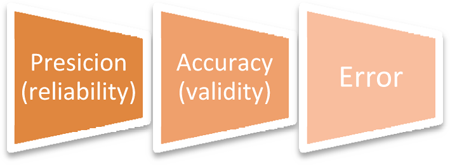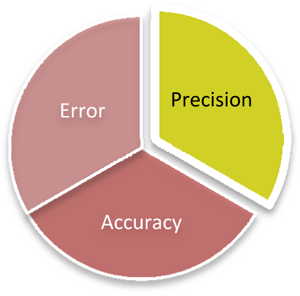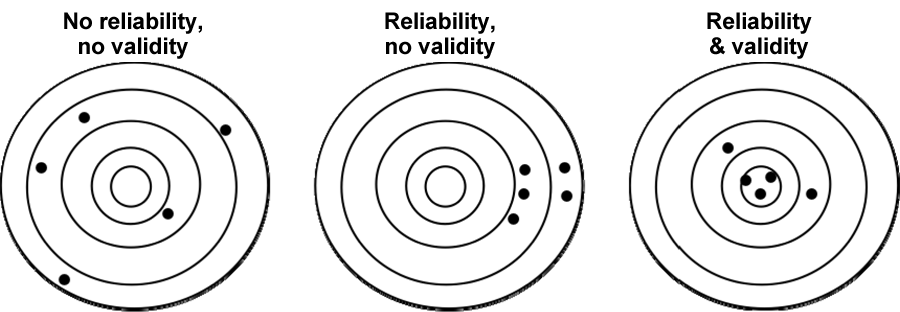Section 2: Factors in Effective Information Gathering
 Three major concepts are important to understand in order to collect useful and valuable research information: precision (i.e., reliability), accuracy (i.e., validity), and error.
Three major concepts are important to understand in order to collect useful and valuable research information: precision (i.e., reliability), accuracy (i.e., validity), and error.
2.1 Precision (i.e., Reliability)
It is very important to make sure the information gathering methods are precise (i.e., reliable). This means that a method measures the same thing every time you use the method.
 There are many things that can affect an instrument's or a method's precision (i.e., reliability). This includes the form of the instrument (e.g. oral or written), the environment in which it is administered, how the staff administers it, the difference in participants from group to group and across time, and the time of the day it is administered (among many others). The researcher can also influence precision (i.e., reliability) by either overtly or inadvertently praising, complimenting or admonishing the participant. The principal investigator is responsible for providing proper training and “spot checks” for how instruments or methods are administered to ensure that the research study is conducted with precision.
There are many things that can affect an instrument's or a method's precision (i.e., reliability). This includes the form of the instrument (e.g. oral or written), the environment in which it is administered, how the staff administers it, the difference in participants from group to group and across time, and the time of the day it is administered (among many others). The researcher can also influence precision (i.e., reliability) by either overtly or inadvertently praising, complimenting or admonishing the participant. The principal investigator is responsible for providing proper training and “spot checks” for how instruments or methods are administered to ensure that the research study is conducted with precision.
Research studies are often criticized because they did not use precise methods to gather data. Precision (i.e., reliability) helps to promote research that is of greater value because you can be more confident that the findings are real.
Definition: Precision (i.e. reliability) means that a method measures the same thing every time you use the method.
Here is an example illustrating reliability (precision) and validity (accuracy) in reaching the target (e.g., center of the circle).

Case Example for Precision (i.e., Reliability)
A study is designed to see if a new anti-hypertension drug is effective in reducing blood pressure. Participants in the study have their blood pressure measure to see if the drug has an effect on lowering blood pressure. The study design requires that blood pressure is taken when the individual is in a quiet location using a digital blood pressure monitor.
Section 2.1: Discussion Questions
- Imagine that the researcher decides to take the participant's blood pressure after he or she has completed a vigorous exercise routine. Would this be consistent with the research design? Why or why not?
- In another situation, the researcher takes an individual's blood pressure in a noisy household where many young children are playing in the same room. Would this be consistent with the research design? Why or why not?
- A researcher accidentally breaks the digital blood pressure monitor and decides to use a manual blood pressure cuff like a nurse would use during a routine check up. Would this be consistent with the research design? Why or why not?






